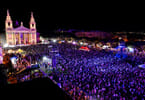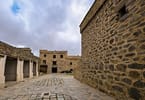Duesseldorf, Germany – The city’s once-yearly, one-day phenomenon falls on Monday, March 7, (called “Rose Monday”) this year: A city known for its cosmopolitan character and sophisticated living (Düsseldorf ranks No. 6 on a list of global cities in quality of life) lets its hair down, unleashes its wild side, and transforms into a place where rip-roaring behavior is suddenly acceptable.
The Rhine region is known as Germany’s center of carnival festivities, or Rhenish Carnival, and Carnival in Duesseldorf is one of the strongholds. More than 300 carnival sessions and costume balls take place during Carnival season, also called Fools’ season, which kicks off on November 11 and ends on Ash Wednesday (the beginning of Lent: March 9, 2011). The season culminates in Rose Monday, its highlight. The city has no fewer than 60 carnival clubs, and their members are among the 5,500 parade participants who also make up the 45 bands and 70 floats. One million people, many dressed up in costumes and called fools, line up to watch the Rose Monday parade, shout “Helau” (the local carnival greeting), and catch the candy (called “Kamelle”) that is thrown into the crowds from the floats. The parade is more than a mile and a half long.
Because of Duesseldorf’s 260 bars, pubs, and restaurants in the city’s historic Old Town, the city is also known as “the longest bar in the world”. And these venues become the backdrop for the extended festivities as the parade spills into the entire city and the revelers take over.
In addition to the parade there is “Altweiberfastnacht” on the Thursday before Rose Monday (March 7, 2011). Extremely popular with Duesseldorf’s women, it’s a time for them to storm the town hall, a custom developed in previous ages to show the town fathers who’s boss. Revelers cut men’s ties off – not just in the town hall, but also from any man on the street. In anticipation of the big parade, Sunday, the day before, has an almost Venetian atmosphere. On Düsseldorf’s famous shopping boulevard Königsallee, partiers in costume meet to dance, sing, or simply have fun.
Miraculously, the city is back to its civilized self two days later, on Ash Wednesday, when Lent begins, and with it the long wait until the Carnival season kicks off again the next November.
For more information about Carnival in Düsseldorf, please visit www.comitee-duesseldorfer-carneval.de.






















